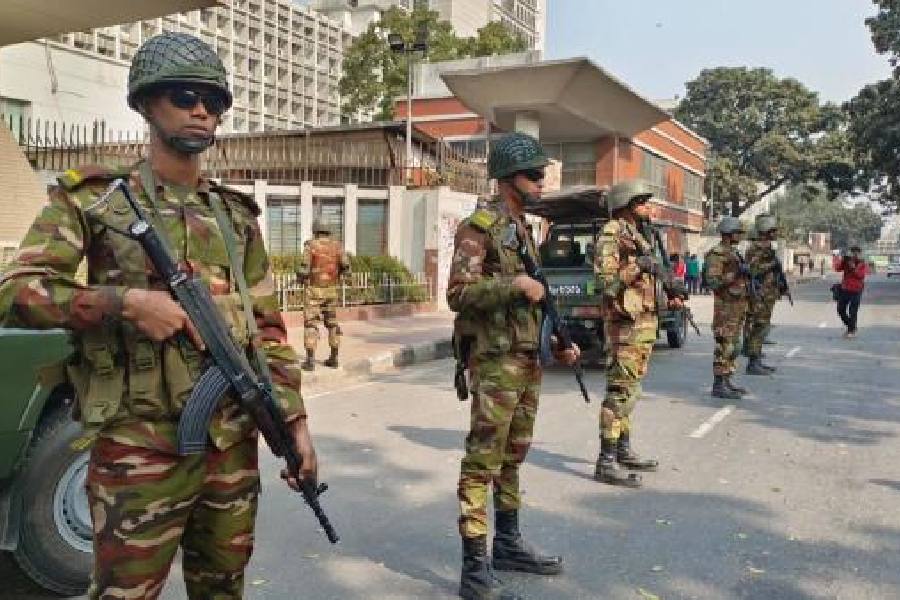Bangladesh chief election commissioner Kazi Habibul Awal has assured people that all possible arrangements have been made for free and fair conduct of Sunday’s general election and urged voters to come out and vote.
But the fear of arson and violence on polling day has continued to cast a pall across the country.
“We are hopeful that the election will be free and fair.... We are deploying around 800,000 armed law enforcers, including from the armed forces, for the over 262,000 polling booths to ensure peaceful conduct of the polls,” Awal said at a briefing on Saturday afternoon. “We urge voters to come out to vote....”
Awal, however, also sounded a word of caution referring to the main Opposition Bangladesh Nationalist Party’s plea to voters to stay away from the booths.
“But I must also admit that the elections are being held in an unusual atmosphere as one of the major Opposition parties has given the call for a poll boycott.
“They have the right to give a boycott call, but no one can physically prevent voters from going to the booths or inflict violence, because that is an offence,” Awal said.
While the BNP claims it’s carrying out a peaceful movement to build opinion against the election, reports of arson have come from across Bangladesh over the last few days, raising the question whether the polls would be held peacefully.
While the poll panel reassured people about a heavy deployment of law-enforcing agencies across Bangladesh, an eerie silence prevailed in Dhaka on Saturday evening with usually crowded roads looking deserted.
“I’m rushing back home after this trip. There is an ominous silence all around and I’m feeling scared,” said auto-rickshaw driver Abdul Malek. “You never know when someone will suddenly come and set your vehicle on fire,” added the young man, who was undecided whether to go out and vote on Sunday.
The possibility of violence and arson was the main topic of discussion on Saturday after some people set fire to four compartments of the Benapole Express in Dhaka’s Gopibagh area on Friday night, killing four people including at least two children.
Media reports said this was the eighth arson attack on trains since November 16, and the cumulative death toll was around 10.
Although the BNP has officially condemned the train attack, police have arrested six people — including Nabiullah Nabi, joint convener of the party’s Dhaka South unit — in connection with the incident.
Amid the pervasive fear among ordinary Bangladeshis, Awal and other poll panel officials have issued several statements trying to assuage the concerns and instil confidence among the voters.
The effectiveness of these assurances — against the backdrop of at least 15 arson attacks in the last 16 hours on trains, road vehicles and polling centres — will be tested on Sunday when polling will be held between 8am and 4pm.
Counting in Bangladesh begins at the polling stations immediately after the last vote has been cast. A poll panel source said the results can be expected from late Sunday evening with the final picture emerging by Monday afternoon.
With the BNP boycotting the polls, a resounding victory for the ruling Awami League is almost certain. According to some in the Bangladeshi media, the election has turned into a friendly contest between the ruling party’s official nominees and dissidents.
This narrative and the absence of the BNP are being cited as the reasons behind the apparent lack of public interest in the polls.
Against this backdrop, the biggest question surrounding the election is the final voter turnout figure.
“It’s very difficult to forecast the turnout as the major Opposition party is not contesting,” Awal said in response to a question from this newspaper.
“Even if the turnout is very low, say one per cent or five per cent, we will have to count the votes and declare the winner as we have a first-past-the-post electoral system.”
Awal refused to go into the larger question whether a low turnout would rob the election of credibility. “Had the BNP taken part in the elections, it would surely have been more participatory,” was all he would say.
Whether and how much the absence of the main Opposition party might affect the credibility of the election has been a subject of impassioned debate here over the last month or so.
With the intensity of this debate peaking over the last few days, there have been media reports about the Awami League using various means to shore up the turnout, such as setting up local committees with the mandate of taking voters to the booths.
“It is primarily the job of the candidates to take the voters to the polling booth.... We also encourage people to come and vote, but it’s a minor responsibility for the commission. Our job is to ensure free and fair polls and we are committed to that objective,” Awal said.
“That’s why we want the election to be monitored both locally and internationally,” he added.











